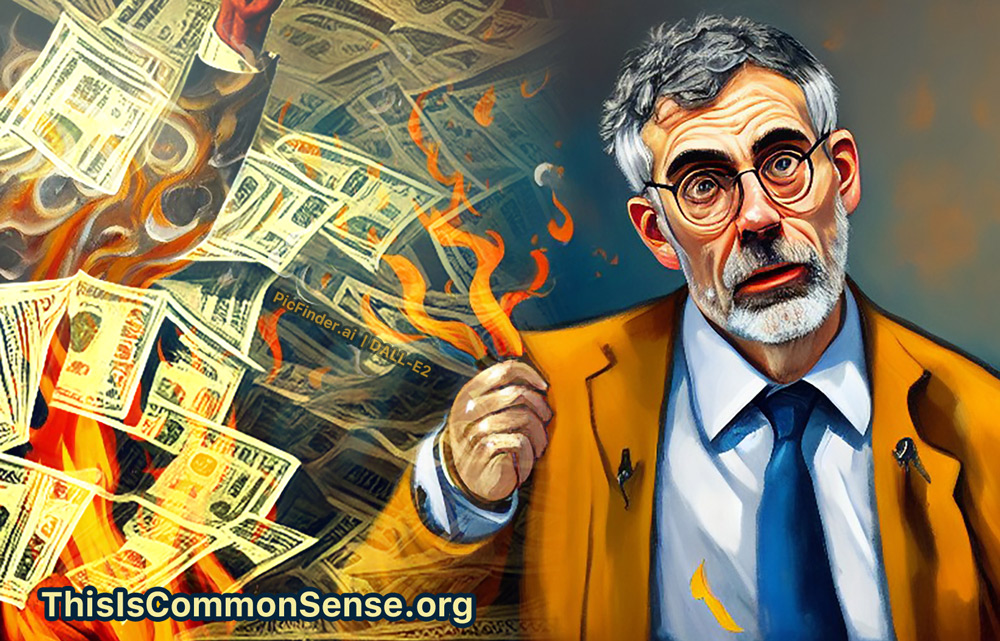Social Security was never designed for sustainability. The “Ponzi” element was there at the beginning: early recipients received HUGE benefits over their contributions, but as the population matured, that ratio of what working taxpayers put in compared to what they received in benefits decreased.
Further, because there never was a “lock box” much less any investment of funds — it was always a transfer scheme — as the system matured it hit the point of financial default. Back in the 80s this was fixed by raising the taxes on working people.
And then the kicker: with the rate of reproduction in the U.S. falling like Sisyphus’s rolling stone, the ratio of taxpayers to subsidized retirees went in the wrong direction. The folks assigned to keep track of the system’s finances predict that a major insolvency moment occurs about a decade from now, a few years ahead of earlier predictions.
So what does Nobel-winning economist Paul Krugman, of The New York Times opinion page, advise?
While we fret about the devastation that benefit cuts and tax hikes would cause, Reason’s Eric Boehm notes that Krugman doesn’t think the cuts are necessary. “First, Krugman says the CBO’s projections about future costs in Social Security and Medicare might be wrong. Second, he speculates that they might be wrong because life expectancy won’t continue to increase. Finally, if those first two things turn out to be at least partially true, then it’s possible that cost growth will be limited to only about 3 percent of gross domestic product (GDP) over the next three decades and we’ll just raise taxes to cover that.”
Hope over reason! And the progressive’s blithe acceptance of always-increasing tax burdens.
Serious people should confront facts … and avoid Krugman.
This is Common Sense. I’m Paul Jacob.

Illustration created with PicFinder.ai and DALL-E2
See all recent commentary
(simplified and organized)
See recent popular posts

6 replies on “Decreases & Increases & Krugman”
I am not now nor have I ever been a Keynesian. Yet, in fairness, I note that, as foolish as Keynesians are, they are seldom such dunces as is Mr Krugman; and that, as dishonest as so many of them have been, most are not so dishonest as is Mr Krugman.
He is even more to be pitied than despised.
A failure of life expectancy to continue to lengthen will not charge the reality that the SS system is underfunded given the present life expectancy. It, without reform, is presently insolvent and everyone with any prescience is well aware of that fact, including Mr. Klugman (who will likely be deceased before the reality he denies actually happens).
Medicare is a different issue and as the government continues to fund more and more of the medical services the answer there will be “solved” by rationing, a denial of service to those where the costs do not have a corresponding benefit satisfactory to the only payor, the government. Such choices always have to be made, and in my opinion are better made by the patient than by reference to a bureaucrat’s manual. It is the cost of dying, not its timing or the length of life, which is breaking that system. As long as there is no cost to the recipient for extraordinary care, and a rational choice of giving your wealth to the medical system or leaving some of it to your heirs does not have to be made, the resulting economically irrational system must self-destruct.
Look to Canada and England — they are further down the path than the US. Canada is now providing ending of life “care” as a preferred substitute for additional medical care.
The average American man of Krugman’s age can expect to live another fourteen years. Mr Krugman is affluent, and can be reasonably expected to live longer than average.
He cannot, however, be expected to acknowledge that is believe in state solutions was wrong. He has only ever moved leftward.
Easy solution. Print the money to cover any deficit. What is a few trillion more!
It’s possible that Mr. Krugman will someday come up with a prognostication that justifies his Nobel and is worth listening to.
Just not likely.
Adding to the crisis is the fact that over the past 2 years the all cause mortality rate has increased ~40%, most of this among working age people.